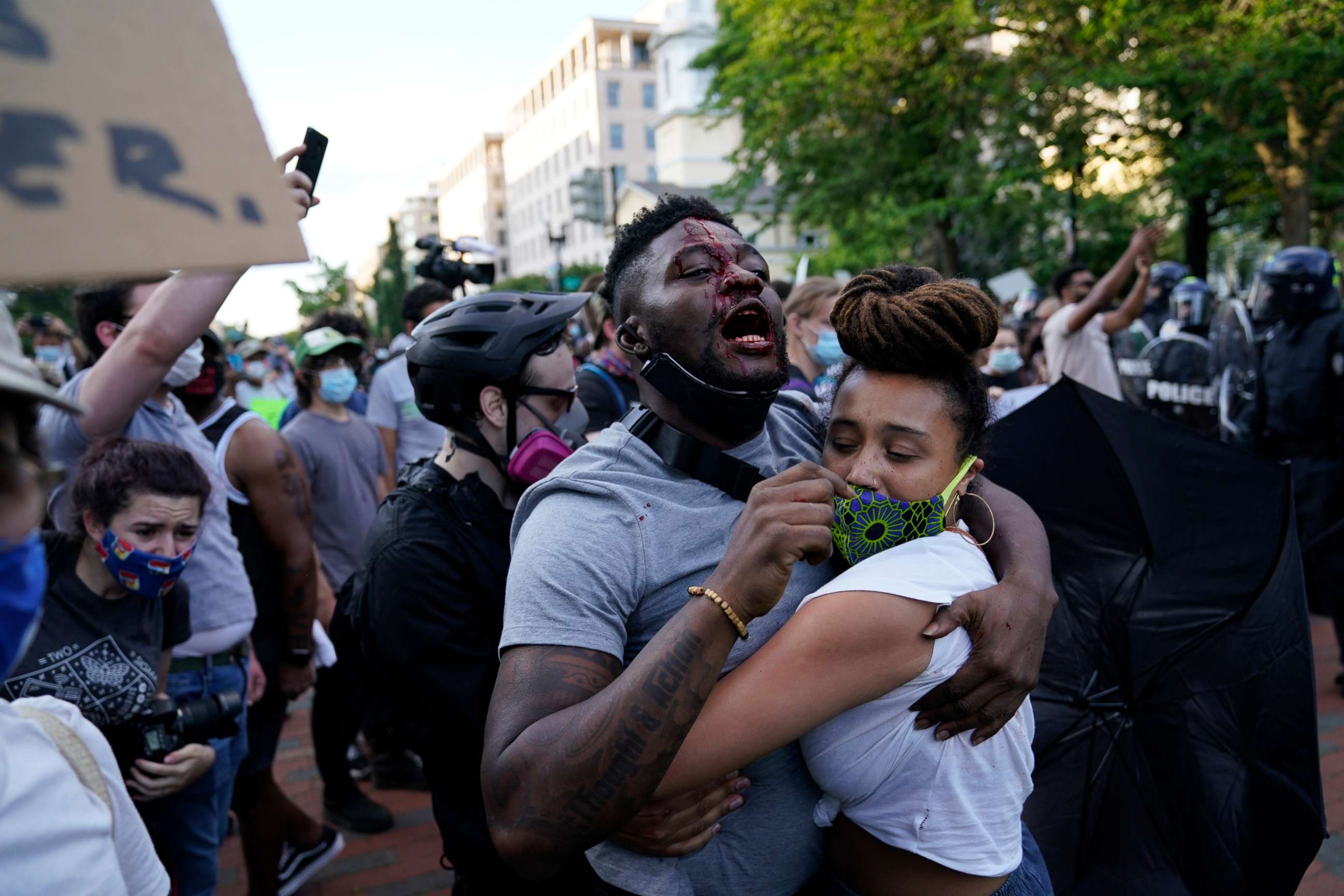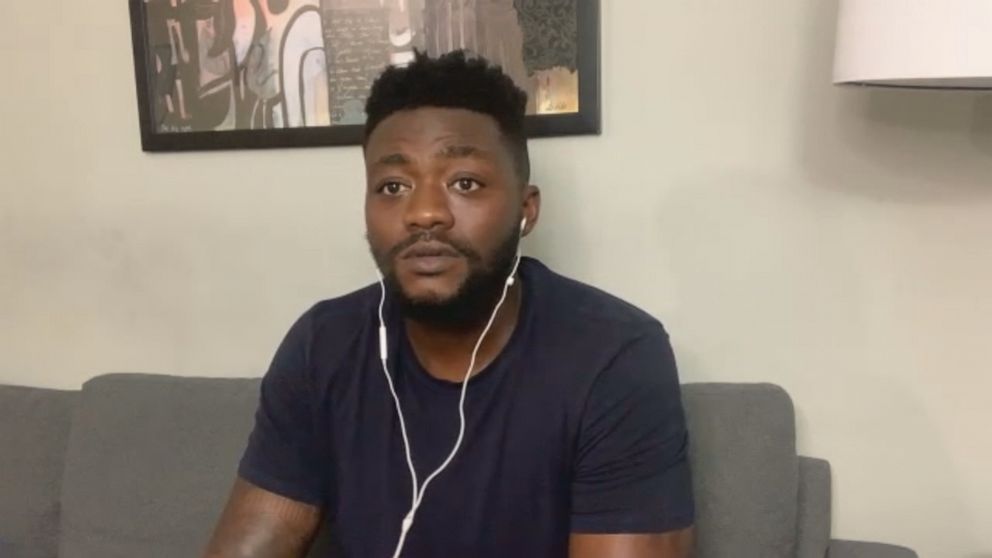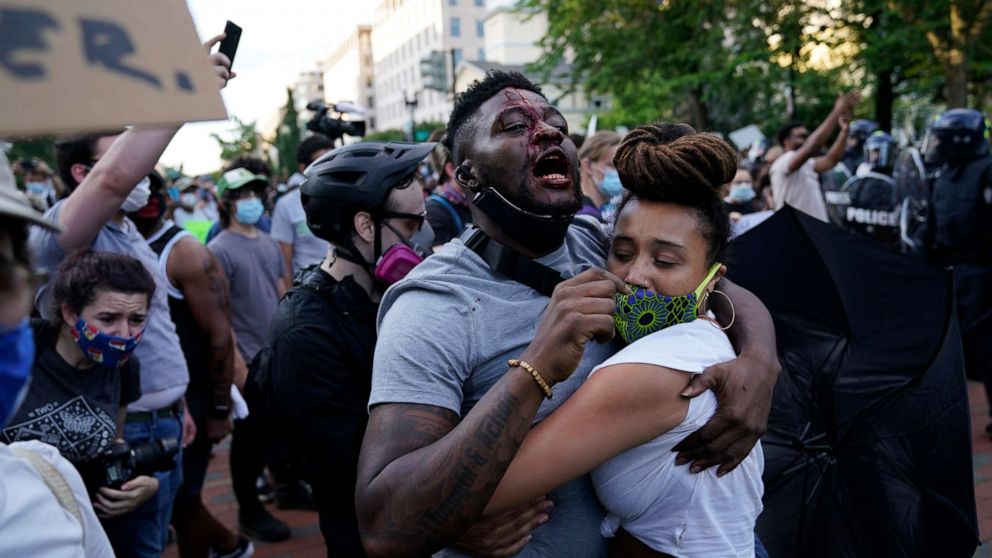DC protester seen injured in viral photos: 'We want the same rights as you'
Abimbola George, a protester who was injured near the White House last weekend, says he doesn't expect the demonstrators protesting the death of George Floyd and police brutality to "slow down, stop or leave" anytime soon.
George, an educator in Washington, D.C., sustained a head injury on May 30, when he says a police officer "cracked my head open with a metal pole." Images of him following the attack, taken by The Associated Press, were subsequently shared on social media, where they went viral.
On that day, he says the protests had been peaceful until authorities, who were "just bouncing around, waiting for instruction to go," began advancing on them.
"It's hard to just own it until you see it, but being that we had a gate in front of us, the police came to the gate, and then they eventually came over the gate ... then start pushing people," he told "Nightline" co-anchor Byron Pitts. "You know, we can only do so much ... and to try and be there in a peaceful manner, and we don't have the weapons they have, but they're still coming closer and they're knocking people down."
Two days later, following a White House address by President Donald Trump, authorities forcefully dispersed a crowd of peaceful protesters in Lafayette Park with flash-bangs and what they described as tear gas to make way for the president to walk to St. John's Episcopal Church for a photo op.
George said these actions "sustain" a cycle of anger between protesters and those who support the use of force to control the protests. He also believes the president is fostering a belief that if you go out and protest you are going to get hurt.
The White House has denied authorities used tear gas on protesters, and in a statement, U.S. Park Police also said authorities hadn't used tear gas, but rather that "smoke canisters" and "pepper balls" had been deployed.

George thinks the demonstrations have bothered people because "folks are so into being in control."
"As American citizens ... we pride ourselves on being free ... and right now we're actually exercising what that freedom is," he said. "I can see how that scares the powers that be, but I don't think they should be scared. I think we should come to the table and just say, 'We want the same rights as you.'"
George said he's been protesting for different causes for over a decade. This time, he said, it's different. He's seen a lot of people "who haven't spoken up before, speak now."
"I think we've put the premise out there that if you're not speaking, that's your decision," he said. "That means you do not support what's going on."
"I think for a long time, people had been joining protests from their couch. ... Even though, to some, this moment might not really make sense, but to those who care about police brutality, this moment was coming and this moment has always been there," he added. "We're just adding people to the conversation."

On Wednesday, charges against Derek Chauvin, the former Minneapolis police officer who knelt on George Floyd's neck, were upgraded to second-degree murder and manslaughter. The other three officers who were involved in his death were also arrested and charged with aiding and abetting.
George said charges were to be expected: "We're glad that these charges happened, but you can see our frustration in saying that we don't think they're severe enough."
He said the protests must now evolve so that those attending can take on more defined roles. His role, he said, has been to educate those who show up.
"A lot of the things I see live are people kind of standing around waiting for instruction, and it doesn't always have to be someone yelling and chanting," he said. "It can literally be people getting to know each other -- us using this as a classroom on the street -- and I really think if we start thinking about this a little bigger ... people, in general, will see protesters not as looters or rioters, but as people, as thinkers ... who really want to exercise their First Amendment rights."




